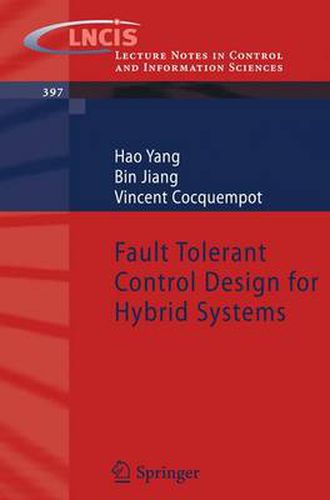Readings Newsletter
Become a Readings Member to make your shopping experience even easier.
Sign in or sign up for free!
You’re not far away from qualifying for FREE standard shipping within Australia
You’ve qualified for FREE standard shipping within Australia
The cart is loading…






This title is printed to order. This book may have been self-published. If so, we cannot guarantee the quality of the content. In the main most books will have gone through the editing process however some may not. We therefore suggest that you be aware of this before ordering this book. If in doubt check either the author or publisher’s details as we are unable to accept any returns unless they are faulty. Please contact us if you have any questions.
Hybridsystems(HS)aredynamicalsystemsthatinvolvetheinteractionofconti- ousanddiscretedynamics.ThestudyofHSismotivatedbythefundamentally- bridnatureofmanyreallifeapplications.Overthelastdecade,signi?cantprogress has taken place in modeling and simulation, veri?cation, stability and controller synthesisforHS. Faultsinautomatedprocessesoftencauseundesiredreactionsandshut-downof a controlledplant,andtheconsequencescouldbedamagetotechnicalpartsofthe plant or to its environment. Fault diagnosis (FD) and fault tolerant control (FTC) arehighlyrequiredforsafetypurpose,andaimatguaranteeingcertainsystemp- formances and/or properties to be maintained in spite of faults. In the past more than30years,fruitfultheoreticalresultsonFDandFTChavebeenreportedforv- iouslinearandnonlinearsystemswithmanysuccessfulengineeringapplicationsin practicalsystems. FD problem for HS has attracted some attentions. However, to the best of the authors’ knowledge, until now, the FTC issue for HS has not yet been intensively studied. FTC method for HS deserves further investigations due to its academic meaningaswellaspracticalone. 1. Motivationfromacademicresearch Itiswellknownthatthestabilityandsomespeci?cationsofHScanbeachieved underquite rigorousconditions. Most of existing results are devotedto off-line analysisanddesign,suchthattheHSworkswellaswhatitisexpected.However, faultsmayabruptlychangesystembehavior,FTCstrategiesmustbeapplied- line,notonlytokeepthestabilitybutalsotomaintainsomespeci?cationsofthe HSinpresenceoffaults.Thisresultsinagreattheoreticalchallenge,sincemany classicalFTCmethodsfornon-hybridsystemscannotbeeasilyextendedtoHS. FTCtheoryforHSneedstobedeveloped. VIII Preface 2. Motivationfrompracticalapplications Manypracticalsystemshavetobemodeledbyhybridmodels,e.g.chemicalp- cesses,switchedRLCcircuits,intelligenttransportationsystems,etc.Thesafety andreliabilityofthesesystemsareneeded,andFTCtechniquesforHSarehighly required. The HS considered in this book consists of a series of continuous modes and a switching logic. Switching from one mode to another is due to a switching law generated from the switching logic. Faulty behaviors of HS are investigated s- tematically.Two main kindsof faults are considered:Continuous faults that affect continuous modes; Discrete faults that affect the desired switching. In these two faultycases,theFTCdesignhastwomainobjectivesasfollows: 1) maintainthecontinuousperformancesincludingvariousstabilities (e.g.L- punovstability,asymptoticalstability andinput-to-statestability)oftheoriginand theoutputtracking/regulationbehaviorsalongthetrajectoriesofHS. 2) maintain the discrete speci?cations that have to be followed by HS, e.g. a desiredswitchingsequence.
$9.00 standard shipping within Australia
FREE standard shipping within Australia for orders over $100.00
Express & International shipping calculated at checkout
This title is printed to order. This book may have been self-published. If so, we cannot guarantee the quality of the content. In the main most books will have gone through the editing process however some may not. We therefore suggest that you be aware of this before ordering this book. If in doubt check either the author or publisher’s details as we are unable to accept any returns unless they are faulty. Please contact us if you have any questions.
Hybridsystems(HS)aredynamicalsystemsthatinvolvetheinteractionofconti- ousanddiscretedynamics.ThestudyofHSismotivatedbythefundamentally- bridnatureofmanyreallifeapplications.Overthelastdecade,signi?cantprogress has taken place in modeling and simulation, veri?cation, stability and controller synthesisforHS. Faultsinautomatedprocessesoftencauseundesiredreactionsandshut-downof a controlledplant,andtheconsequencescouldbedamagetotechnicalpartsofthe plant or to its environment. Fault diagnosis (FD) and fault tolerant control (FTC) arehighlyrequiredforsafetypurpose,andaimatguaranteeingcertainsystemp- formances and/or properties to be maintained in spite of faults. In the past more than30years,fruitfultheoreticalresultsonFDandFTChavebeenreportedforv- iouslinearandnonlinearsystemswithmanysuccessfulengineeringapplicationsin practicalsystems. FD problem for HS has attracted some attentions. However, to the best of the authors’ knowledge, until now, the FTC issue for HS has not yet been intensively studied. FTC method for HS deserves further investigations due to its academic meaningaswellaspracticalone. 1. Motivationfromacademicresearch Itiswellknownthatthestabilityandsomespeci?cationsofHScanbeachieved underquite rigorousconditions. Most of existing results are devotedto off-line analysisanddesign,suchthattheHSworkswellaswhatitisexpected.However, faultsmayabruptlychangesystembehavior,FTCstrategiesmustbeapplied- line,notonlytokeepthestabilitybutalsotomaintainsomespeci?cationsofthe HSinpresenceoffaults.Thisresultsinagreattheoreticalchallenge,sincemany classicalFTCmethodsfornon-hybridsystemscannotbeeasilyextendedtoHS. FTCtheoryforHSneedstobedeveloped. VIII Preface 2. Motivationfrompracticalapplications Manypracticalsystemshavetobemodeledbyhybridmodels,e.g.chemicalp- cesses,switchedRLCcircuits,intelligenttransportationsystems,etc.Thesafety andreliabilityofthesesystemsareneeded,andFTCtechniquesforHSarehighly required. The HS considered in this book consists of a series of continuous modes and a switching logic. Switching from one mode to another is due to a switching law generated from the switching logic. Faulty behaviors of HS are investigated s- tematically.Two main kindsof faults are considered:Continuous faults that affect continuous modes; Discrete faults that affect the desired switching. In these two faultycases,theFTCdesignhastwomainobjectivesasfollows: 1) maintainthecontinuousperformancesincludingvariousstabilities (e.g.L- punovstability,asymptoticalstability andinput-to-statestability)oftheoriginand theoutputtracking/regulationbehaviorsalongthetrajectoriesofHS. 2) maintain the discrete speci?cations that have to be followed by HS, e.g. a desiredswitchingsequence.